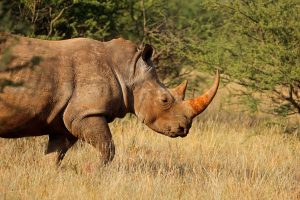Thai authorities have extradited to the United States a Malaysian national accused of orchestrating the large-scale trade in endangered wildlife products from Africa to Asia. Teo Boon Ching, 57, was arrested in Thailand on June 29 for wildlife trafficking and money laundering, charges that he is now set to face in the U.S.
Teo, known by the nicknames “Dato Sri” and “Godfather,” is alleged to sit at the center of a globe-spanning wildlife trading network that channels valuable endangered wildlife products from Africa to nouveau riche consumers in Vietnam and China. Among the main trafficked products are such things as ivory, rhino horn, and pangolin scales.
In a statement Friday announcing sanctions against Teo and his alleged trafficking organization, the U.S. Treasury Department said that he has engaged in the “cruel trafficking of endangered and threatened wildlife and the products of brutal poaching.”
“During his two-decade-long involvement in the illegal wildlife trade, Teo Boon Ching claims to have transported multiple metric tons of rhino horn, ivory, and pangolins,” the statement added. “Although Teo Boon Ching has been publicly linked to the illicit wildlife trade for years, he has evaded justice and continued to operate his illicit transportation enterprise.”
Even though he is now in U.S. custody, the sanctions announced Friday are designed to deny Teo and others access to any property or financial assets held in the United States. They will also prevent American firms and citizens from doing business with them. Also sanctioned was the Malaysian company Sunrise Greenland Sdn. Bhd.
Teo’s arrest followed a sting in which he conspired with an anonymous plant to “transport, distribute, sell, and smuggle at least approximately 73 kilograms of rhinoceros horns,” with an estimated value of $725,472. According to a statement from the U.S. Attorney’s Office Southern District of New York, Ching has been charged with one count of conspiracy to commit wildlife trafficking, which carries a maximum sentence of five years in prison, and two counts of money laundering, which carries a maximum sentence of 20 years in prison.
Alongside the booming trade in illegal narcotics, the trafficking of rare and endangered animal products has flourished in the loosely policed borderlands of mainland Southeast Asia. The trigger for the trade has been the emergence of large middle classes in China and to a lesser extent Vietnam, where rhino horns and pangolin scales are used in all manner of quack health tonics.
Southeast Asia has been a key link, due both to its proximity to China and the loose regulatory frameworks in particular regions. According to the Treasury Department, Teo’s smuggling networks “generally utilized routes through Malaysia and Laos.” The latter country in particular has become an increasingly important transshipment route for various illicit goods, particularly methamphetamines from eastern Myanmar, given its relaxed regulations, high levels of corruption, and porous borders with both Myanmar and China.
Teo’s extradition came as authorities in Singapore seized their largest-ever shipment of smuggled rhino horn this week, valued at some $830,000. In a statement, Singapore’s National Parks Board said 20 pieces of horn weighing a total of 34 kilograms were discovered on October 4 in two bags at Singapore Changi Airport, en route to Laos.

































